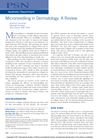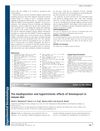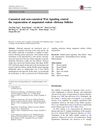 17 citations,
December 2004 in “The Journal of Men's Health & Gender”
17 citations,
December 2004 in “The Journal of Men's Health & Gender” Male pattern baldness involves hormone-related hair thinning, shorter hair, and inflammation.
 13 citations,
January 2021 in “RSC chemical biology”
13 citations,
January 2021 in “RSC chemical biology” Wnt activation shows promise for regenerative medicine but requires selective targeting to minimize risks like cancer.
 10 citations,
April 2019 in “Journal of Analytical Science and Technology”
10 citations,
April 2019 in “Journal of Analytical Science and Technology” Lactobacillus plantarum hydrolysates may help increase hair growth by boosting VEGF production.
[object Object]  6 citations,
July 2017 in “Plastic surgical nursing : official journal of the American Society of Plastic and Reconstructive Surgical Nurses”
6 citations,
July 2017 in “Plastic surgical nursing : official journal of the American Society of Plastic and Reconstructive Surgical Nurses” Microneedling is effective for skin rejuvenation and various skin issues, but more research is needed to confirm its safety and effectiveness.
 6 citations,
January 2013 in “Experimental dermatology”
6 citations,
January 2013 in “Experimental dermatology” Bimatoprost increases hair growth in mice without breaking down into other substances.
 6 citations,
January 2013 in “Journal of Clinical and Diagnostic Research”
6 citations,
January 2013 in “Journal of Clinical and Diagnostic Research” AMH levels are higher in women with PCOS and can indicate the number of small follicles in their ovaries.
 5 citations,
January 2016 in “Journal of Molecular Histology”
5 citations,
January 2016 in “Journal of Molecular Histology” Both main and alternative Wnt signaling are important for regrowing rodent whisker follicles.
 2 citations,
February 2009 in “Folia Pharmacologica Japonica”
2 citations,
February 2009 in “Folia Pharmacologica Japonica” The document concludes that more research is needed to create specific drugs for treating male pattern baldness.
 1 citations,
November 2001 in “British Journal of Dermatology”
1 citations,
November 2001 in “British Journal of Dermatology” Oral cyclosporin doesn't stop hair loss.
[object Object]  September 2023 in “Nature communications”
September 2023 in “Nature communications” Alk1 in specific cells is crucial for proper nerve branching and hair function.
 September 2017 in “Springer eBooks”
September 2017 in “Springer eBooks” PRP injection therapy shows promise for treating hair loss, increasing hair count and thickness with minimal side effects.
 293 citations,
November 2011 in “Nature”
293 citations,
November 2011 in “Nature” The circadian clock affects skin stem cell behavior, impacting aging and cancer risk.
 277 citations,
June 2003 in “The journal of investigative dermatology. Symposium proceedings/The Journal of investigative dermatology symposium proceedings”
277 citations,
June 2003 in “The journal of investigative dermatology. Symposium proceedings/The Journal of investigative dermatology symposium proceedings” Epithelial-mesenchymal interactions control hair growth cycles through specific molecular signals.
 270 citations,
March 2012 in “Dermatologic Surgery”
270 citations,
March 2012 in “Dermatologic Surgery” Platelet-rich plasma can potentially promote hair growth by stimulating cell growth and increasing certain proteins.
 204 citations,
October 1999 in “EMBO journal”
204 citations,
October 1999 in “EMBO journal” Overexpression of activin A in mice skin causes skin thickening, fibrosis, and improved wound healing.
 176 citations,
May 2020 in “Dermatologic Therapy”
176 citations,
May 2020 in “Dermatologic Therapy” COVID-19 can cause different skin symptoms that may help with early diagnosis and show how severe the disease is.
 171 citations,
July 2007 in “Journal of Investigative Dermatology”
171 citations,
July 2007 in “Journal of Investigative Dermatology” A substance called DKK-1 increases in balding areas and causes hair cells to die when exposed to DHT.
 166 citations,
September 2011 in “Dermatologic Surgery”
166 citations,
September 2011 in “Dermatologic Surgery” Platelet-rich plasma with a new carrier significantly increases hair thickness without serious side effects.
 148 citations,
December 2018 in “Journal of autoimmunity”
148 citations,
December 2018 in “Journal of autoimmunity” Alopecia areata is an autoimmune disease causing patchy hair loss, often with other autoimmune disorders, but its exact causes are unknown.
 137 citations,
September 2005 in “Proceedings of the National Academy of Sciences of the United States of America”
137 citations,
September 2005 in “Proceedings of the National Academy of Sciences of the United States of America” The HR protein helps hair grow by blocking a hair growth inhibitor, aiding in hair follicle regeneration.
 136 citations,
April 2016 in “Dermatologic Surgery”
136 citations,
April 2016 in “Dermatologic Surgery” PRP treatment helps hair growth and density in androgenetic alopecia patients.
 130 citations,
November 2017 in “Frontiers in Immunology”
130 citations,
November 2017 in “Frontiers in Immunology” The conclusion is that Treg-targeted therapies have potential, but more knowledge of Treg biology is needed for effective treatments, including for cancer.
 125 citations,
September 2001 in “The FASEB Journal”
125 citations,
September 2001 in “The FASEB Journal” Stress can cause hair loss by negatively affecting hair follicles and this effect might be reversed with specific treatments.
 115 citations,
January 2014 in “Journal of Cutaneous and Aesthetic Surgery”
115 citations,
January 2014 in “Journal of Cutaneous and Aesthetic Surgery” Platelet-rich plasma (PRP) is a cheap and easy treatment for hair loss, but not suitable for everyone. It also helps in healing ulcers, rejuvenating skin, and improving hair transplants.
 115 citations,
September 2012 in “Experimental Dermatology”
115 citations,
September 2012 in “Experimental Dermatology” Androgens have complex effects on hair growth, promoting it in some areas but causing hair loss in others, and our understanding of this is still evolving.
 113 citations,
December 2000 in “The journal of investigative dermatology. Symposium proceedings/The Journal of investigative dermatology symposium proceedings”
113 citations,
December 2000 in “The journal of investigative dermatology. Symposium proceedings/The Journal of investigative dermatology symposium proceedings” KGF and activin are crucial for skin healing and repair.
 108 citations,
August 2017 in “Clinical, Cosmetic and Investigational Dermatology”
108 citations,
August 2017 in “Clinical, Cosmetic and Investigational Dermatology” Microneedling is promising for treating various skin issues but needs more research to confirm its effectiveness and safety.
 100 citations,
September 2017 in “Molecular and Cellular Endocrinology”
100 citations,
September 2017 in “Molecular and Cellular Endocrinology” Male hormones and their receptors play a key role in hair loss and skin health, with potential new treatments being explored.
 100 citations,
November 1996 in “Molecular Medicine Today”
100 citations,
November 1996 in “Molecular Medicine Today” Growth factors and cytokines are important for hair growth and could potentially treat hair loss, but more research is needed to overcome challenges before they can be used in treatments.
 99 citations,
July 2017 in “Clinical Reviews in Allergy & Immunology”
99 citations,
July 2017 in “Clinical Reviews in Allergy & Immunology” New treatments for Alopecia Areata show promise but need to be more effective and affordable.






























